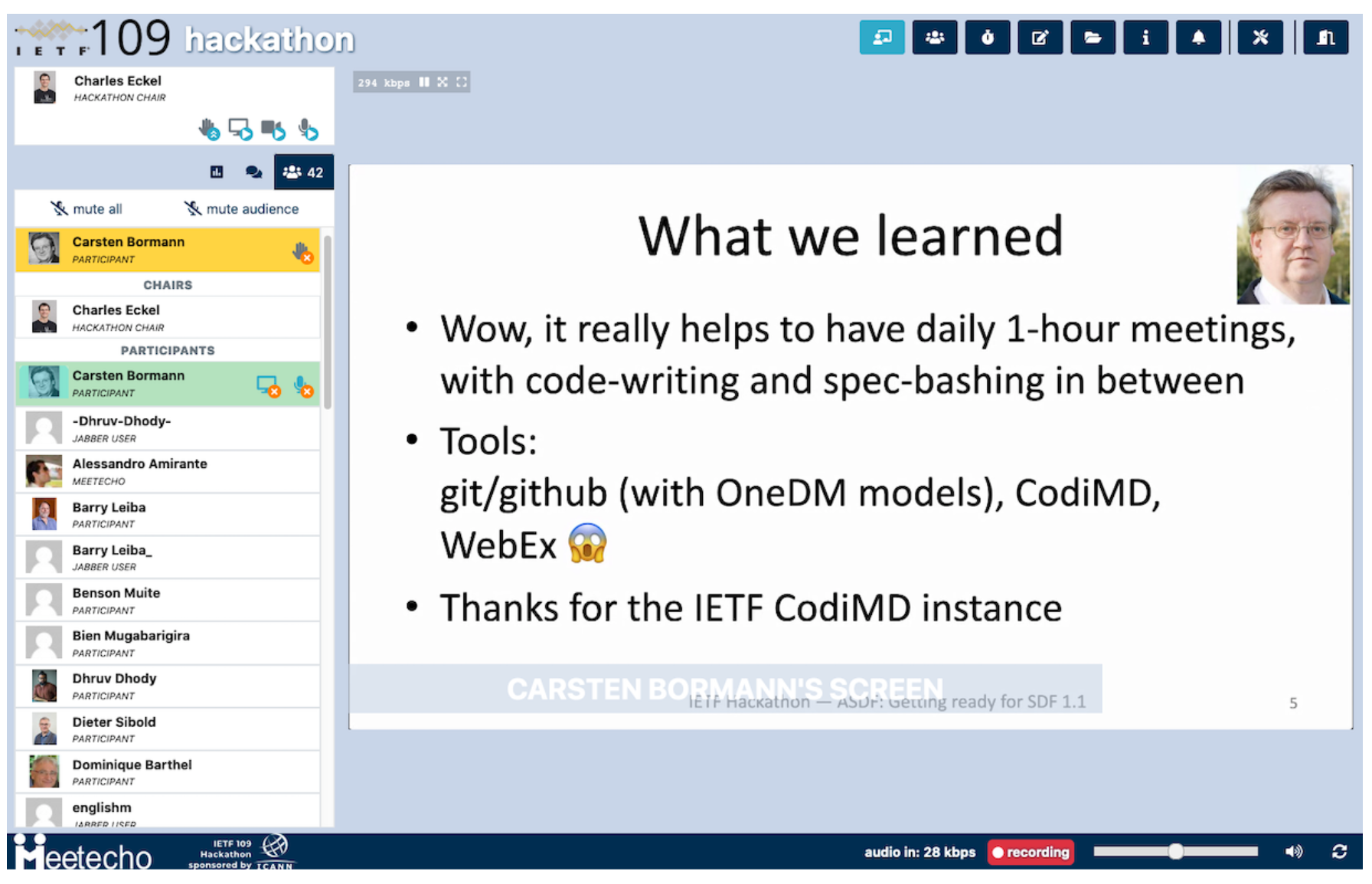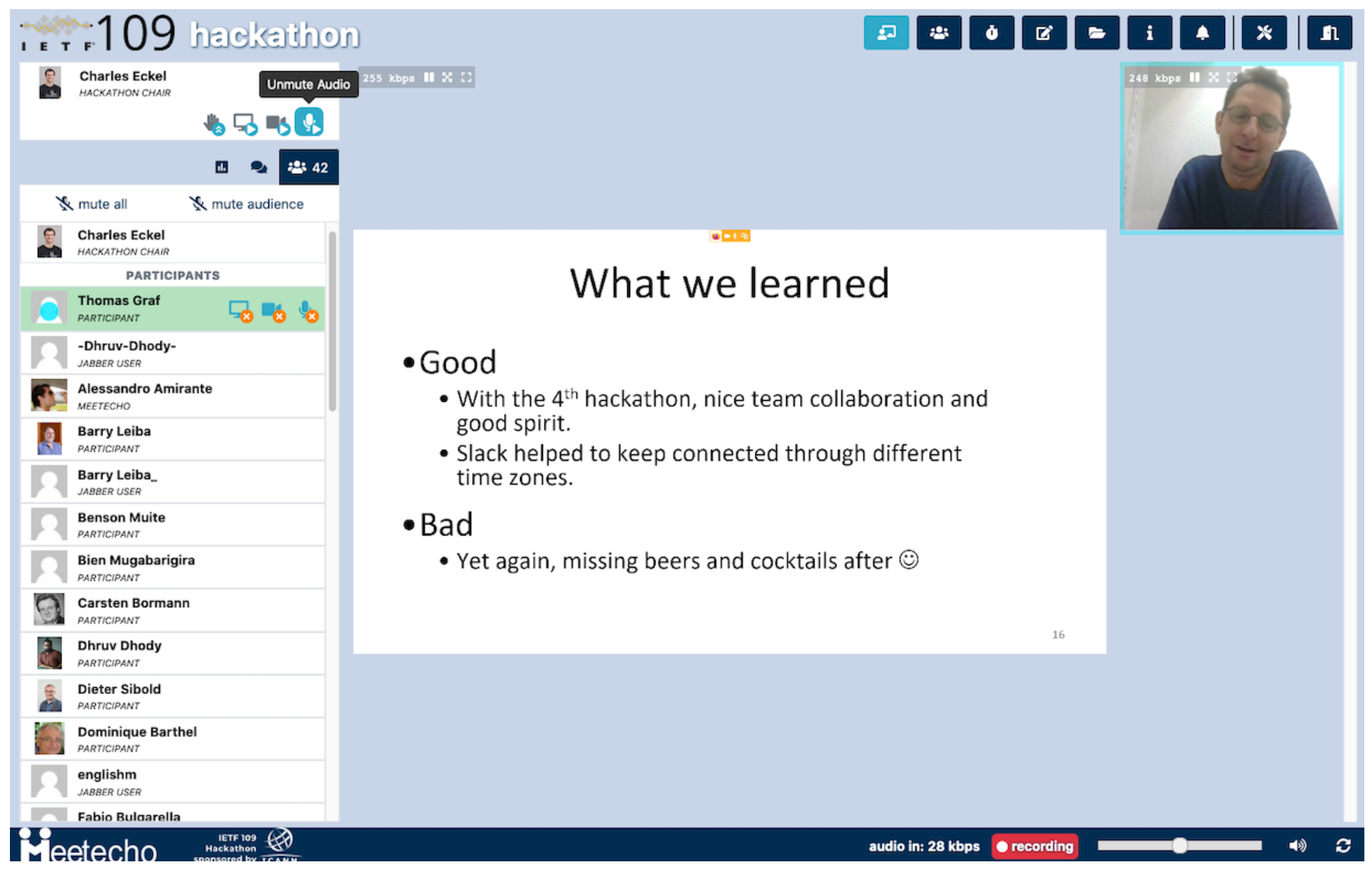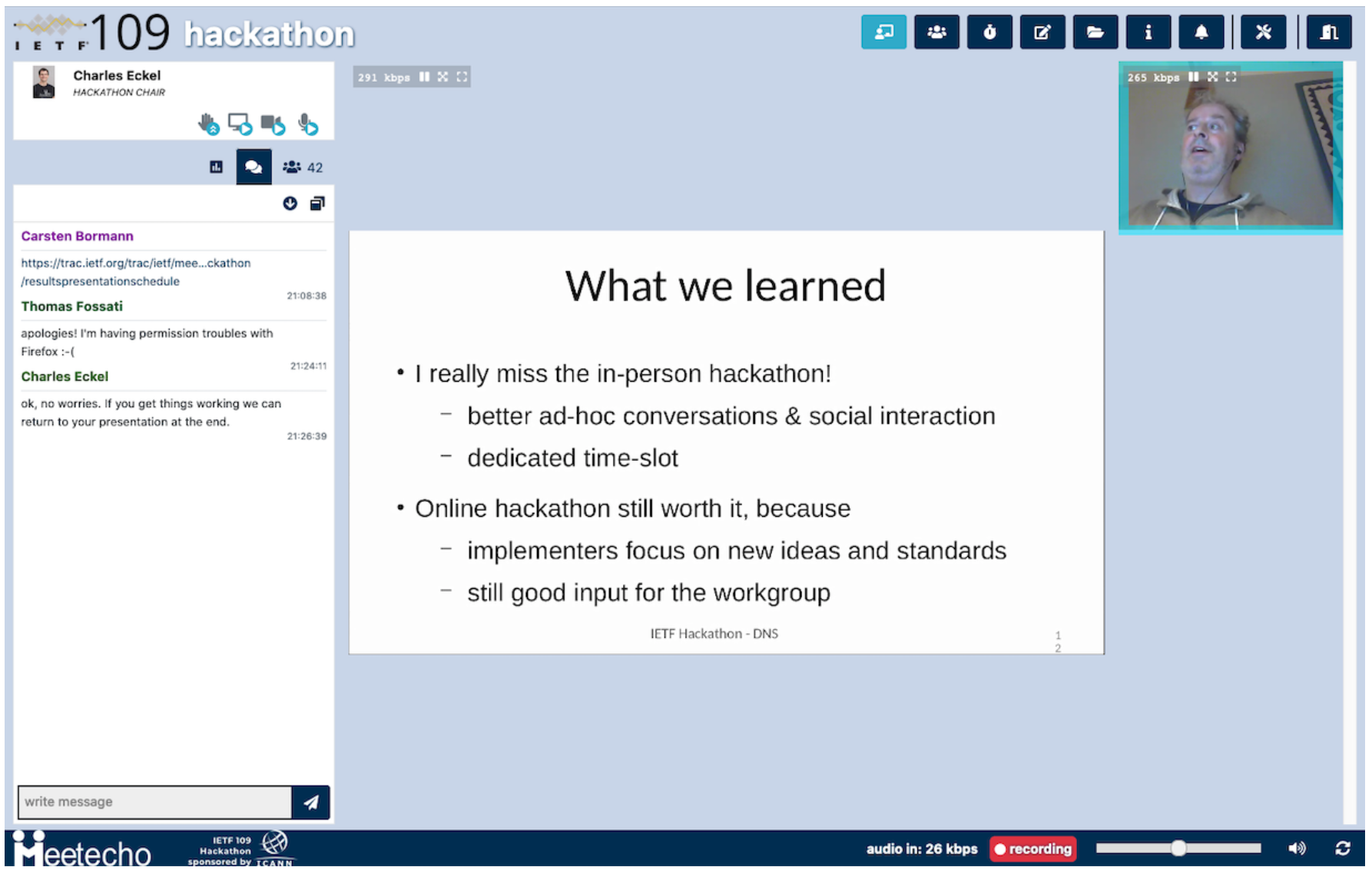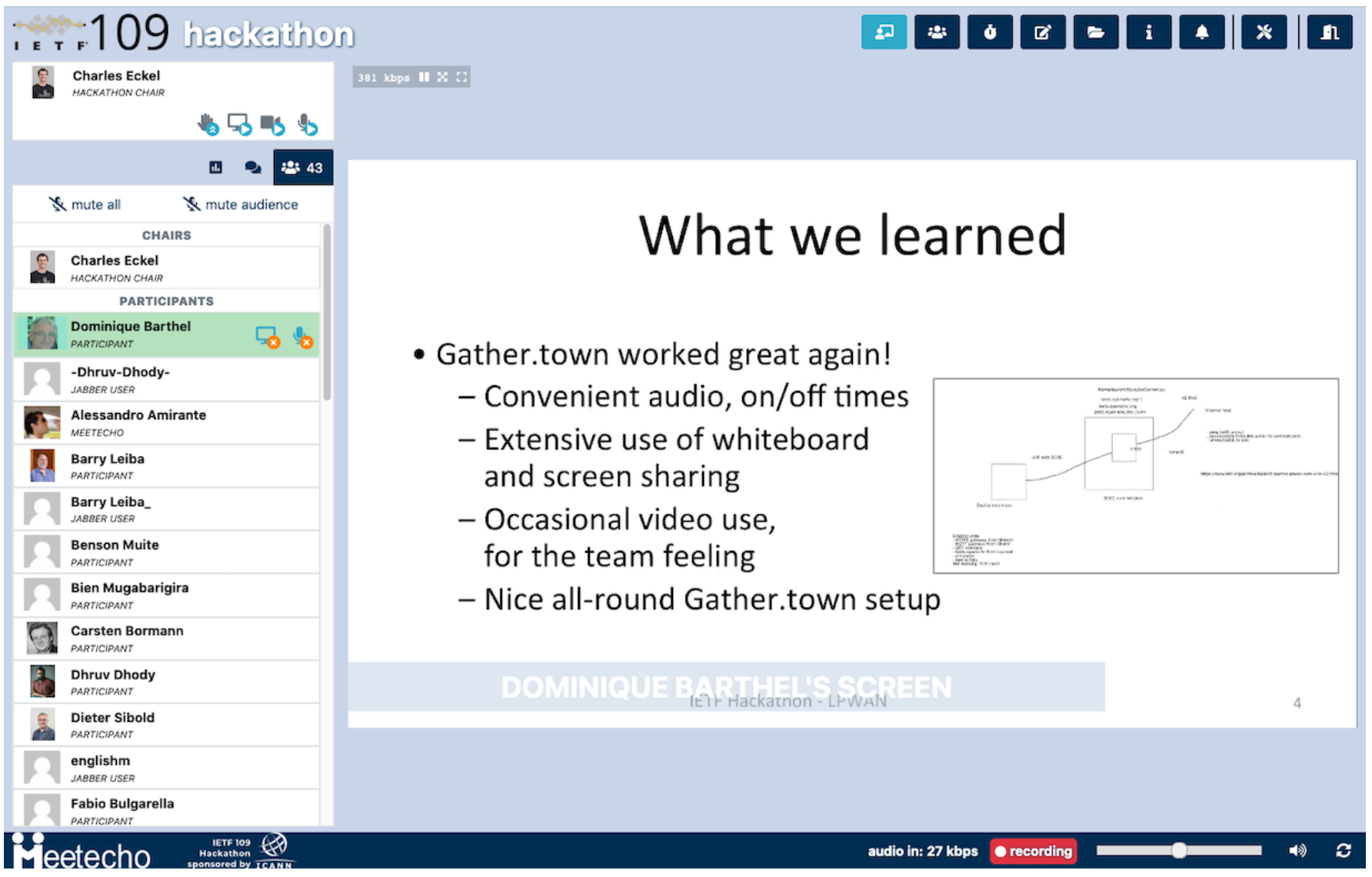Filter by topic and date
IETF 109 Hackathon – Finding New Ways to Collaborate
- Charles Eckel IETF Hackathon Co-chair
2 Dec 2020
For the global IETF community, the past year has been about adapting the way we do things to fit a reality that has not allowed us to gather in person. This means finding ways to remain focused on accomplishing our goals, even if that means working a bit differently. That has definitely been true for IETF Hackathon.
Though nothing beats getting together in person, during the latest edition we were able to build on the lessons of the past 8 months and accomplish a lot during the week-long online event.
IETF Hackathons encourage the IETF community to collaborate and develop utilities, ideas, sample code, and solutions that show practical implementations of IETF standards. IETF Hackathons aim to:
- Advance the pace and relevance of IETF standards activities by bringing the speed and collaborative spirit of open source development into the IETF
- Bring developers and young people into IETF and get them exposed to and interested in IETF
IETF Hackathons are free to attend and open to everyone. Software developers are the primary audience, but participation by subject matter experts who are not necessarily developers is encouraged and very important as well. Similarly, while the Hackathon is meant to attract newcomers and those who do not typically view themselves as standards people, long time IETF contributors, including Internet-Draft authors, working group chairs, and subject matter experts, are key participants. Group dynamics and blending of skillsets and perspectives are extremely valuable aspects of IETF Hackathons.
In addition to the running code created and improved as a result of each Hackathon, the exchange of ideas; extensions of human networks; and establishment of trust, respect, and friendships are some of the most valuable outputs of each Hackathon. Code written in a programming language sometimes can be more illustrative and less confrontational than text in a draft or an email. Working together to find common understanding of proposals, concerns, and solutions that result in improvements to evolving Internet-Drafts is as important as the development of running code that implements or validates the correctness of these same drafts.
Consequently, IETF Hackathons are collaborative events, not competitions. Any competitiveness among participants is friendly and in the spirit of advancing the pace and relevance of new and evolving internet standards.
Optimizing online experience
The IETF 107 Hackathon was originally scheduled to be the weekend of March 21-22, 2020, at the start of the IETF meeting in Vancouver. When COVID-19 hit and it became clear the IETF meeting could not occur in person, we were faced with a difficult decision of what to do about the Hackathon. The fact that the Hackathon was planned for the weekend before the IETF meeting and in the local time zone, both of which were historically very convenient and attractive to Hackathon participants, suddenly became huge obstacles. Consequently, the Hackathon was cancelled, making IETF 107 the first IETF meeting without a hackathon since its introduction at IETF 92 in March of 2015.
We knew further in advance that IETF 108 would be an online only meeting. We moved and expanded the format of the Hackathon to run the entire work week before the rest of the IETF meeting. The Hackathon kickoff was set for Monday and the closing for Friday, with all the time in between left for individual project teams to arrange to meet how and when was most convenient for them. The kickoff and closing sessions were schedule to align with the time zone established for the IETF 108 meeting. All of this was, of course, not ideal, and it worked much better for some people than for others, but at least everyone knew the plan and corresponding time commitment well in advance and had the ability to plan accordingly.
The response was great. We ultimately had 19 projects and nearly 300 registrations. It is hard to say how many people actually participated and for how long, but many projects were able to get significant work done. For the closing, 10 teams produced and shared presentations summarizing their findings and achievements. While this was obviously not as productive and impactful as previous in person IETF Hackathons, the overall format used for IETF 108 worked well enough to serve as a blueprint for future online IETF Hackathons.
One week in Bangkok, virtually
IETF 109 was originally scheduled for November 13-20 in Bangkok, Thailand but it was evident several months in advance that the meeting would almost certainly need to be switched to online only. Plans were put in place from the start to do the same for the Hackathon. We used what we learned from our experience at IETF 108 and worked on some enhancement to try to make the IETF 109 Hackathon a better experience for a greater number of participants.
The IETF meeting was based on local time in Bangkok, with sessions running from 05:00 UTC to 11:00 UTC. This meant meeting from 9pm to 3am for the west coast of the United States, midnight to 6am for the east coast, and early morning until midday for most of Europe. The Hackathon was again scheduled for the entire week before the rest of the IETF meeting, with a kickoff set for Monday, November 9 at 05:00 UTC, the closing for Friday, November 13 at 05:00 UTC, with all the time in between left for individual project teams to arrange to meet how and when was most convenient for them.
Total registrations were almost 300, similar to the IETF 108 Hackathon. It is hard to say how many people actually participated and for how long. Perhaps better metrics are the number of projects, which increased from 19 for IETF 108 to 24 for IETF 109, and the number of projects presenting results at the end, which increased from 10 for IETF 108 to 15 for IETF 109. Despite the fact the Hackathon closing occurred when many participants would typically be sleeping, the presenters and those listening to their presentations had the stamina to stay engaged for the entire two-hour session. Details about all the projects are on the Hackathon wiki, all the presentations have been uploaded to IETF-Hackathon GitHub, and a recording of the session is available on the IETF YouTube Channel.
Improved collaboration mechanisms
We enhanced the tooling introduced for the IETF 108 Hackathon and added some new options as well. The space created in Gather for IETF 109 included a revamped area allocated to the Hackathon. The area included tables, identified by letters of the alphabet, that teams could to self-assign and use as and when they liked. Eight to ten seats around each table facilitated group discussions within the team. A whiteboard or a shared notes tablet (via IETF’s CodiMD) at each table facilitated sharing of information within the team. The tables also facilitated collaboration across teams.
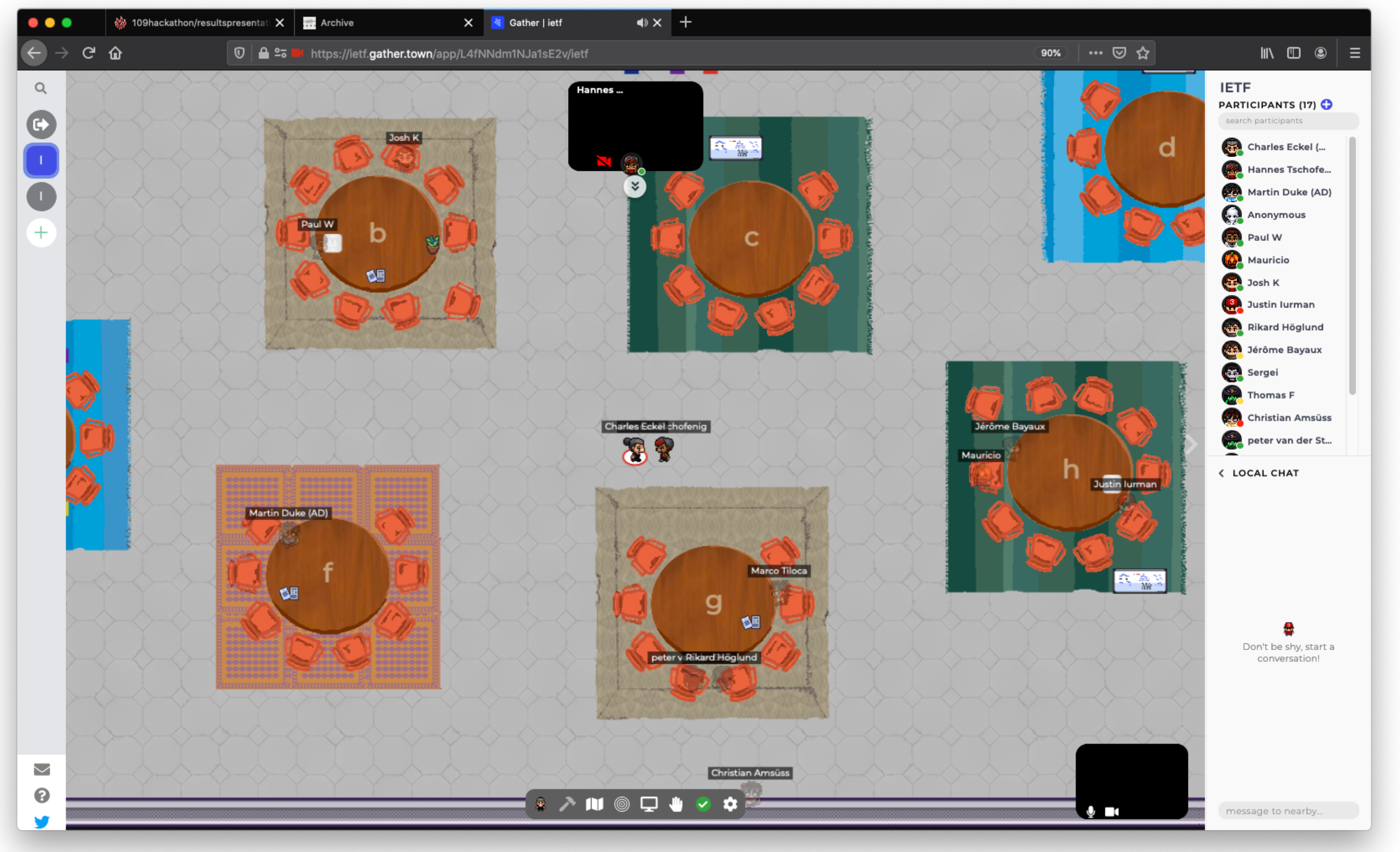
For in-person Hackathons, access to the IETF meeting network is an important aspect of the Hackathon. The IETF network provides unfettered Internet access that is not typical within many residential, corporate, and university environments. For many IETF participants and projects, access to the Internet and each other via wireless access to the IETF network is sufficient. However, due to the nature of the work done in the IETF, wired access and special networking capabilities are often required.
The ability to connect remotely to a virtual IETF network, which debuted at IETF 108 Hackathon, was improved for IETF 109. Noteworthy enhancements included a ticketing system that streamlined request and setup of remote networking, and keys that improved security and the ability to reliably identify when a member of a given team connected to the network.
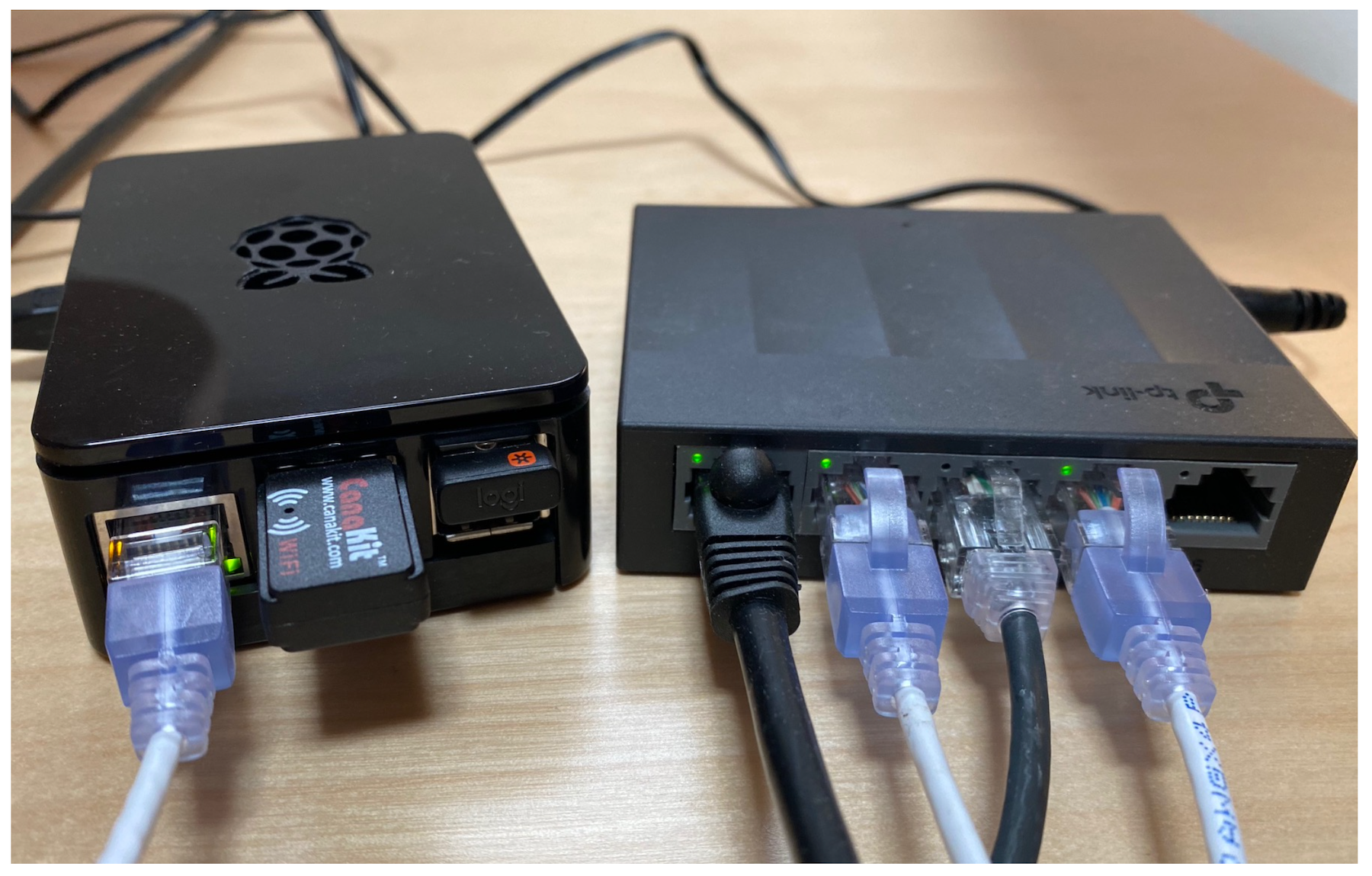
Thank you sponsors and supporters
Special thanks to ICANN for sponsoring the hackathon. Many of our typical expenses were reduced or eliminated as a result of not meeting in person, but new and expanded tools to facilitate increased collaboration online resulted in new expenses elsewhere. We greatly appreciate this sponsorship and welcome and encourage additional sponsors. By sponsoring the hackathon, you can help ensure it remains a free event accessible to everyone.
We also thank Cisco DevNet, who sponsored and ran the first several hackathons and continue to be big supporters. Networking standards are critical to Cisco’s business, and the IETF Hackathons provides a great way to engage with end users, not only with product APIs but also in support of standards that enhance interoperability and serve as integration points.

Finally, special thanks to the IETF Secretariat, NOC, LLC, Tools Team, MeetEcho, and Gather developers for all their efforts to make the online Hackathon possible and a success.
Next Time
It was already been announced that IETF 110 will be an online only meeting, so we know the IETF 110 Hackathon will be online only as well. Mark your calendars now for the IETF 110 Hackathon, March 1-5, 2021, and keep up to date on all the latest info by subscribing to hackathon@ietf.org. We hope you will join us!
To get a flavor for what the IETF 110 Hackathon holds, see the following screenshots from various team presentations at the end of the IETF 109 Hackathon.
